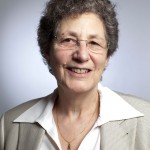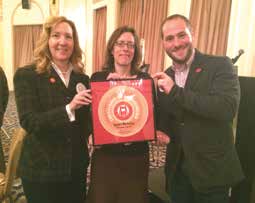 By Dr. Marcy Adelman–
By Dr. Marcy Adelman–
If you are a low-income resident in San Francisco and need to make safety upgrades to your rental unit, or repairs and safety fixes to your home, Rebuilding Together San Francisco can help.
Rebuilding Together SF is a local LGBTQ-welcoming non-profit with a three-decade record of community service. This year alone the organization made free safety modifications and repairs to 275 homes in San Francisco.
“Rebuilding Together SF works to keep seniors, families and people with disabilities in safe, healthy and affordable homes through our free home repair and community revitalization projects,” said Karen Nemsick, MSW, Executive Director of Rebuilding Together SF. “We serve both homeowners and renters, although renters are only eligible for safety modifications.”
Rebuilding Together SF is part of a national organization with affiliates up and down California and across the country. There are 14 Rebuilding Together affiliates in California, including Northern California offices in Redwood City, San Jose, Oakland, Petaluma, Sacramento and San Francisco.
I sat down for a conversation with Nemsick to better understand the services that the organization provides and how low-income residents can benefit from them.

Dr. Marcy Adelman: Who qualifies for free services from Rebuilding Together SF?
Karen Nemsick: The primary qualification is income. If a person makes 80% of the area median income (AMI)—which is about $62,000 a year for one person and $74,000 a year for two people—they can access our services. The average income of people we serve is actually much lower, typically about $25,000 a year.
Dr. Marcy Adelman: What kind of home modifications do you typically provide?
Karen Nemsick: Most repairs we make are simple bathroom modifications such as installing grab bars, bath benches and raised toilet seats. These are simple changes, but they make bathing safer for older adults by reducing the risk of falling. We also install smoke detectors, replace rotted exterior steps, fix interior walls and remove and replace old carpets and unsafe flooring. Of the 275 homes we worked on this year, 45 needed plumbing repairs, such as fixing leaky bathtubs or unclogging sinks and water pipes.
Dr. Marcy Adelman: What impact do these types of repairs and modifications have on people who use your services?
Karen Nemsick: Most people want to stay in their homes and in the communities their families may have lived in for decades. But if you are on a low fixed income, being able to continue to live in your home can mean doing without some of the basic things other people take for granted. For example, in some instances we found that older home owners had just stopped using a sink or tub because they could not afford to hire a plumber. The repairs we make are often very simple, but they have a dramatic impact on the health, safety and well-being of the senior home owners we serve.
Dr. Marcy Adelman: I understand that you work with families as well as seniors. Can you share an example of a recent repair project that you completed for a San Francisco family?
Karen Nemsick: We worked with a family who had been in their home for five generations. They had fallen on hard times and the house was in disrepair, including two decks off the back of the house that were dangerously close to falling off. We tore down the decks and put in a window where a sliding door had been, made other repairs to the interior rooms of the house and cleared out the backyard. When we were done, the owner said to me, “Over the years, this house has seen a lot of chaos and sadness, but now I see brightness and hope.”
Dr. Marcy Adelman: You mentioned that you do community revitalization projects. What are those about?
Karen Nemsick: We’ve held events focused on a single neighborhood where we completed a cluster of home repairs for seven years, and in 2017 we formalized this effort as the “Rebuild My Block” initiative. As we complete home repairs in close proximity to each other—for example, in the Mission or Bayview—we reach out to neighbors to volunteer. We also partner with city agencies like the Department of Public Work’s Fix-It Team and community-based organizations like Friends of the Urban Forest to complete street-level improvements for the whole block.
Dr. Marcy Adelman: Rebuild My Block sounds like a great initiative.
Karen Nemsick: We are very proud of all the work we do. Budget constraints mean we don’t get to do all the things we would like to do. We don’t do extreme makeovers, and neighbors walking by probably won’t notice the safety repairs that we made on the inside of a home. Still, we do a lot to help keep people safe and make them comfortable so they can remain in housing they can afford.
Dr. Marcy Adelman: All of the safety modifications and repairs you do for low-income residents are free for the recipients. Where does your funding come from?
Karen Nemsick: Grab bars, smoke detectors and simple plumbing repairs are paid for by foundation grants and installed by volunteers. We have grants from Archstone, Wells Fargo, and Middle Passage Foundations. We have generous donors and sponsors who give to our annual June fundraising event where we celebrate our volunteers and contractors. The Mayor’s Office of Housing (MOH) provides grants for more significant modifications such as installing a stair lift or making electrical upgrades or repairs to a leaking roof so an older adult or person with a disability can remain in their home. MOH grants allow us to hire professional contractors, roofers, electricians and plumbers for these more significant modifications.
Dr. Marcy Adelman: You mentioned volunteers. How important are volunteers to the work you do?
Karen Nemsick: We couldn’t do what we do without them. Our volunteers do an amazing job! In fact, about 60% of all our repairs are done by volunteers. Many of our skilled volunteers are retired, and some work full-time jobs. All of our Safe at Home installers must pass a background check and are required to go through our training for the installation of safety modifications. Volunteers also do interior painting, replace degraded carpets, pull weeds, do light landscaping, clean clutter and help move and remove boxes. We can always use more volunteers, especially people comfortable and experienced with power tools.
Dr. Marcy Adelman: How can someone interested in using your services contact you?
Karen Nemsick: People can call our office and ask for an application. Most people complete the application without any help. It is pretty straight forward. But if a person has trouble with the application, we are happy to help them fill it out.
Dr. Marcy Adelman: What happens after the application is completed?
Karen Nemsick: Once we receive the application, we’ll call the applicant with follow-up questions. For example, if they indicate that their toilet doesn’t work, we’ll ask what part isn’t working, or if they are having a hard time using the toilet. Their answers will help us determine the extent of the repairs needed. We also screen for the urgency of the repair on that call. For example, someone may have an impending release from a hospital and need to have grab bars installed in the bathroom or a hand rail installed on the inside of the house before the hospital will discharge them. We can usually assign an installer to do the repairs within 10 days.
Dr. Marcy Adelman: Karen, thanks very much for your time and the information on Rebuilding Together SF. Are there any concluding thoughts that you want to share with us?
Karen Nemsick: A lot of people we serve bought their homes, paid their mortgage and pay their bills. They were and are proud of what they have accomplished. But over the years, San Francisco has gotten so expensive; it makes it hard to make ends meet. Even though their mortgage might be paid off and the real estate taxes are low, they have difficulty affording even small improvements. Rebuilding Together SF helps people stay where they want to stay—in a house they are proud of, and in the neighborhood and community where they feel at home.
Getting in Touch
Executive Director Karen Nemsick has a lifelong nonprofit career focused on moving families and women out of poverty. She has brought her leadership skills to programs that serve homeless families, started her own nonprofit called Women in Action to fill a gap in job preparedness training at welfare-to-work programs and was the executive director of Healing Waters, a nonprofit that provides wilderness adventures to men, women and children living with HIV and AIDS. She joined RTSF in June 2009.
Dr. Marcy Adelman oversees the Aging in Community column. She is a psychologist and LGBTQI longevity advocate and policy advisor. She serves on the California Commission on Aging, the Board of the Alzheimer’s Association of Northern California and Northern Nevada and the San Francisco Dignity Fund Oversight and Advisory Committee.
Recent Comments